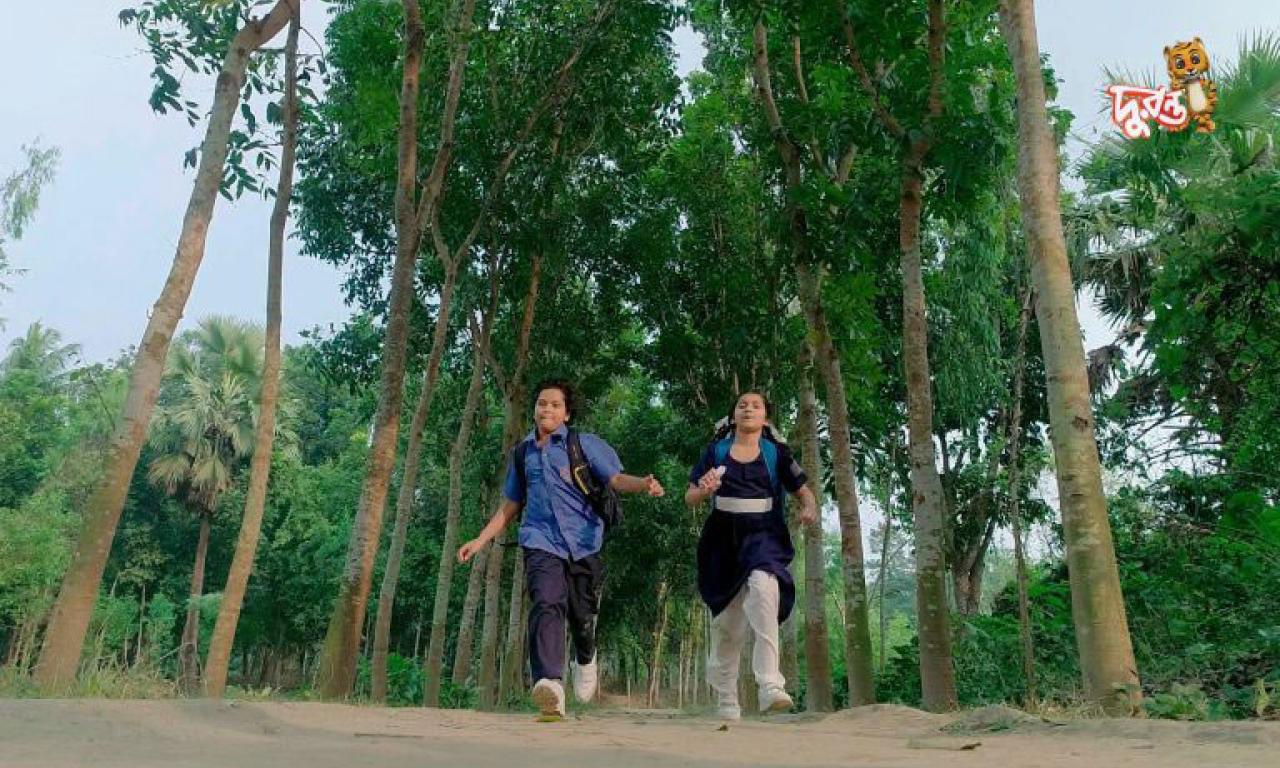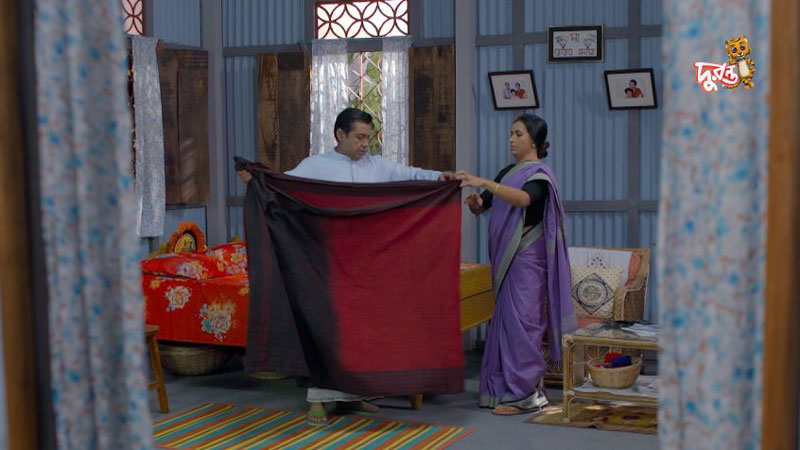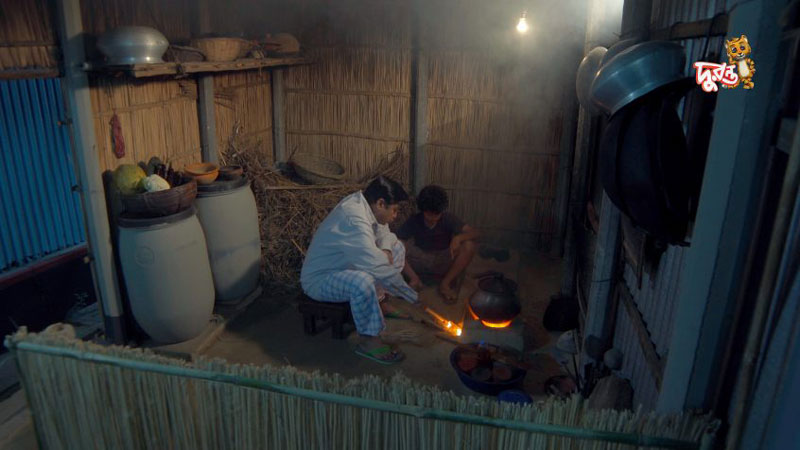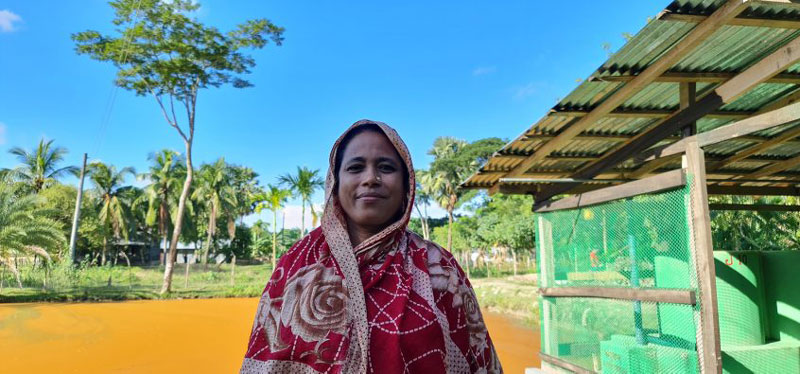
A new children’s TV series promoting fish-based nutrition, gender equality, and women’s involvement in aquaculture has reached almost 600,000 people in Bangladesh.
A new children’s TV series promoting fish-based nutrition, gender equality, and women’s involvement in aquaculture has reached almost 600,000 people in Bangladesh.
Mecho Tota Gecho Bhoot is a 26-episode series that shares positive messages targeting children—newborn to 14 years old—and their parents and caregivers, to drive behavior change.
“In Bangladesh, there are strong gender stereotypes that can create social problems like time burdens for women, gender discrimination in access to nutritious foods and nurturing the potential of girls and boys as they grow up, and social perceptions that limit women engaging in aquaculture,” said Zinat Hasiba, Gender, and Youth specialist for the Feed the Future Bangladesh Aquaculture Activity (BAA).
“When it comes to fish consumption, children are not encouraged to eat fish, and there’s a lack of knowledge on the nutritional benefits of aquatic foods and how to prepare them.”
“Through the drama series, we hoped to tackle these harmful norms by encouraging children and parents to eat more nutritious fish, promoting gender-equal practices in households, and encouraging more women to participate in aquaculture,” she said.
The TV series was developed as part of the BAA project funded by USAID and implemented by the CGIAR Research Program on Fish Agri-Food Systems (FISH) led by WorldFish. The project focuses on achieving inclusive aquatic food farming growth through a market systems approach, which addresses the root causes of why markets often fail to meet the needs of poor people.

Each TV series episode was scripted to be both entertaining and educational and included a range of gender, nutrition, and aquaculture messages.
“Gender messages focused on celebrating friendships between girls and boys, rebutting arguments that restrict women and girls mobility for their safety—rather than taking action to ensure safety, and promoting men’s involvement in childcare and household chores,” said Hasiba of the gender messages.
“Other messages centered on encouraging young women in aqua-business, rebutting the gender norm that ‘cooking is a girls’ thing,’ rebutting the argument that ‘boys are and should be, stronger than girls’, and promoting women in decision-making roles,” she added.
The series was developed and broadcast as part of a 15-month partnership between the BAA project and Duronto TV, one of Bangladesh’s most popular channels.
“Embarking on a TV series enabled us to reach a huge audience, consisting of both consumers of fish and aquaculture companies,” said Hasiba.
Since the series aired on 17 April—11 July 2020 in all eight Bangladesh divisions, the episodes have reached more than 590,000 people. With the series currently being rebroadcast, this number is likely to shoot even higher.
Responses to the show, gathered through SMS quizzes during the episodes and posts on social media, show promising results.
“Over time, we observed increased audience engagement, particularly through social media and direct communication,” said Shafiq Karim from Duronto TV.
For instance, one viewer reported that their 9-year-old daughter was now asking their dad to make them breakfast instead of their mother, who normally prepares breakfast.
“A handful of parents also reported to us that their children are eating more fish now because of this drama series,” said Ali Haider, head of the Barind Media program, who supervised the series creative development.

Overcoming gender barriers
Complementing the TV series, the BAA project has developed and continues to implement other targeted interventions to address harmful gender norms that limit women’s involvement across various aquaculture subsectors.
Women typically look after the homestead ponds at the household level and feed the fish as part of their daily activities. Yet this unpaid work is often unrecognized because it’s believed that only men can be farmers and not women.
“To support the recognition of women’s work, the project incorporated a 2.5-hour gender session as one of eight training sessions on aquaculture and nutrition delivered to project participants, and trained more than 140 employees of seven local NGOs as facilitators,” said Hasiba.
“The gender session is inspired by a gender transformative approach—it involves facilitated discussions and roleplays to support men and women critically reflecting together on gender and how current dynamics and norms affect women, men, and the family.”
Over 12,900 households across 23 districts—21 in southern Bangladesh and 2 in south-eastern Bangladesh—have participated in the training sessions.
For hatcheries involved with the BAA project, which facilitates the production and hatching of fish seeds or eggs for aquaculture, have been involved in training sessions to expand their client base and boost their seed sales.
Usually, hatcheries only target men as their clients as it’s perceived that being a fish seed producer is not for women, who are seen to lack the necessary technical skills.
“To address this gender barrier, the project is working with the 13 private hatcheries to encourage and remind them to target and include women in these training and target them while expanding their client base,” said Hasiba.
More than 1,400 women have been engaged so far as their clients through these BAA hatcheries’ training.
Bina Majhi, founder and manager of Harun Motsho Hatchery, is a partner in the BAA project and one of the few women running a hatchery in Bangladesh.
“I cannot express how great it feels to train up many people in the locality! While facilitating the training, I have been in awe to see these many women interested in establishing their own nurseries and fish farm,” she said.
“Now, all I am looking forward to is transferring the skill and knowledge I have gathered for years to hundreds of women to enter and benefit from the aquaculture sector. I want to work as a mentor for others besides growing my business.”

In the fish feed and seed subsector, women are largely absent. Private companies that sell fish feed to aquaculture producers depend on dealers to sell their products, but most of these are men.
“There’s an informal rule that dealers will be men as women are seen ‘not suitable’ to be a sales agent because, for instance, they can’t be mobile due to home-based caregiving duties or they don’t have the required networks,” said Hasiba.
“As a result, few women employed in feed sectors mostly do desk-based jobs such as customer care or research. But the sector is not about desk-based jobs, so women are being deprived.”
As the efforts to boost hatcheries, the project is working with three feed companies to encourage them to include more women as their agents and clients and recognize that engaging women clients can contribute to company growth.
“By understanding and tackling the gender barriers across all the aquaculture subsectors, women and men have greater opportunity to equitably benefit from the sector, leading to the sector inclusively realizing its growth potential,” said Hasiba.
